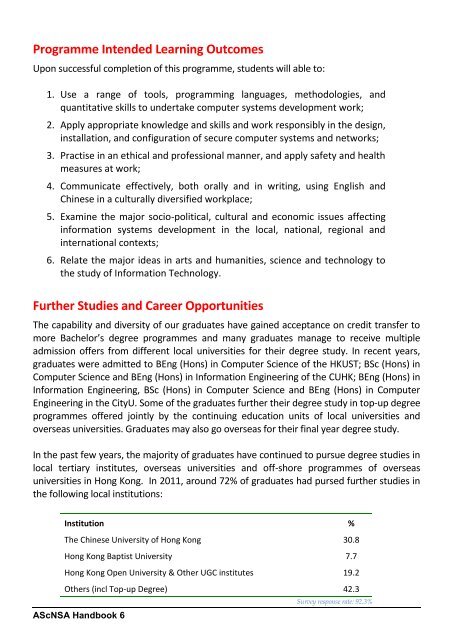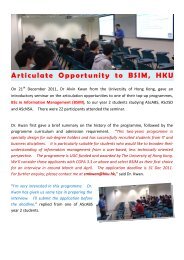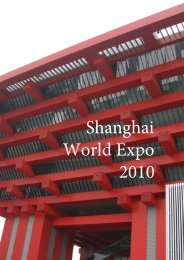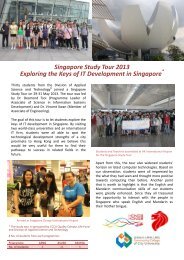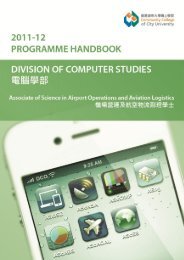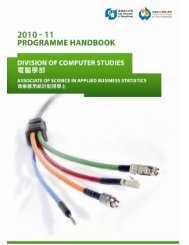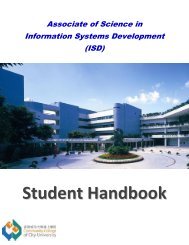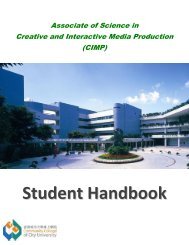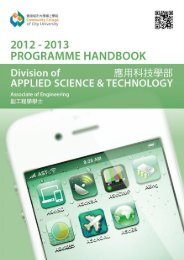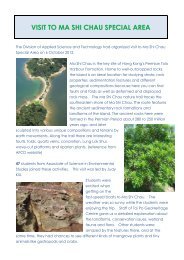AScNSA Handbook 1 - Division of Applied Science and Technology ...
AScNSA Handbook 1 - Division of Applied Science and Technology ...
AScNSA Handbook 1 - Division of Applied Science and Technology ...
You also want an ePaper? Increase the reach of your titles
YUMPU automatically turns print PDFs into web optimized ePapers that Google loves.
Programme Intended Learning Outcomes<br />
Upon successful completion <strong>of</strong> this programme, students will able to:<br />
1. Use a range <strong>of</strong> tools, programming languages, methodologies, <strong>and</strong><br />
quantitative skills to undertake computer systems development work;<br />
2. Apply appropriate knowledge <strong>and</strong> skills <strong>and</strong> work responsibly in the design,<br />
installation, <strong>and</strong> configuration <strong>of</strong> secure computer systems <strong>and</strong> networks;<br />
3. Practise in an ethical <strong>and</strong> pr<strong>of</strong>essional manner, <strong>and</strong> apply safety <strong>and</strong> health<br />
measures at work;<br />
4. Communicate effectively, both orally <strong>and</strong> in writing, using English <strong>and</strong><br />
Chinese in a culturally diversified workplace;<br />
5. Examine the major socio-political, cultural <strong>and</strong> economic issues affecting<br />
information systems development in the local, national, regional <strong>and</strong><br />
international contexts;<br />
6. Relate the major ideas in arts <strong>and</strong> humanities, science <strong>and</strong> technology to<br />
the study <strong>of</strong> Information <strong>Technology</strong>.<br />
Further Studies <strong>and</strong> Career Opportunities<br />
The capability <strong>and</strong> diversity <strong>of</strong> our graduates have gained acceptance on credit transfer to<br />
more Bachelor’s degree programmes <strong>and</strong> many graduates manage to receive multiple<br />
admission <strong>of</strong>fers from different local universities for their degree study. In recent years,<br />
graduates were admitted to BEng (Hons) in Computer <strong>Science</strong> <strong>of</strong> the HKUST; BSc (Hons) in<br />
Computer <strong>Science</strong> <strong>and</strong> BEng (Hons) in Information Engineering <strong>of</strong> the CUHK; BEng (Hons) in<br />
Information Engineering, BSc (Hons) in Computer <strong>Science</strong> <strong>and</strong> BEng (Hons) in Computer<br />
Engineering in the CityU. Some <strong>of</strong> the graduates further their degree study in top-up degree<br />
programmes <strong>of</strong>fered jointly by the continuing education units <strong>of</strong> local universities <strong>and</strong><br />
overseas universities. Graduates may also go overseas for their final year degree study.<br />
In the past few years, the majority <strong>of</strong> graduates have continued to pursue degree studies in<br />
local tertiary institutes, overseas universities <strong>and</strong> <strong>of</strong>f-shore programmes <strong>of</strong> overseas<br />
universities in Hong Kong. In 2011, around 72% <strong>of</strong> graduates had pursed further studies in<br />
the following local institutions:<br />
Institution %<br />
The Chinese University <strong>of</strong> Hong Kong 30.8<br />
Hong Kong Baptist University 7.7<br />
Hong Kong Open University & Other UGC institutes 19.2<br />
Others (incl Top-up Degree) 42.3<br />
<strong>AScNSA</strong> <strong>H<strong>and</strong>book</strong> 6<br />
Survey response rate: 92.3%


